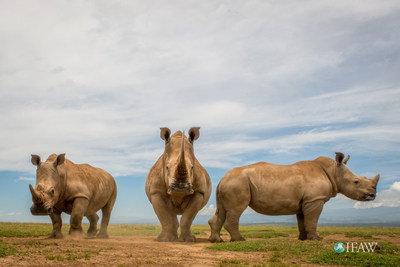South Africa's rhino auction - selling a bloody harvest for profit
CAPE TOWN, South Africa, Aug. 16, 2017 /PRNewswire-USNewswire/ -- Experts say South Africa's first ever legal auction of rhinoceros horn will enrich few, and is likely to speed the road to extinction for one of the world's most endangered species. The auction takes place on Monday.

"This sale of rhino horn is inexcusable," said Dr Joseph Okori, Director for Southern Africa of the International Fund for Animal Welfare (IFAW), a world expert on rhino conservation. "It is a sale based entirely on the greed of one man; plays into the hands of poachers and illegal wildlife traders; and ignores the fact that more than 7,000 rhinos have been brutally killed for their horns in less than 10 years, while countless brave rangers have also died trying to protect rhinoceros."
The horn will be auctioned online from Monday, 21st August by Van's Auctions, and comes from the stockpiles of South Africa's biggest private rhino breeder John Hume. Hume owns about 1,500 rhinoceros and has, for some years, been non-lethally harvesting horns from his rhinoceros with the stated view of selling it for profit. The total amount of horn for sale has not been announced.
The auction has been advertised online, in English, Chinese and Vietnamese versions. The main markets for trafficked rhino horn are Vietnam and China, where the horn is believed fictitiously to have medicinal properties.
"Hume says the profits from the sale of the horn will help him better protect his rhino populations. But the fact that this auction is being so vigorously marketed to the countries that have the highest demand for rhino horn calls into question Hume's motive, which in IFAW's opinion is driven by profit and profit alone with no conservation benefit," says Okori.
"Legalising sale of rhino horn will not reduce demand. As long as a legal market exists, criminals will attempt to launder horns to reap the profits. Currently, no system exists in South Africa or elsewhere in the world, where sufficient checks and balances exist to prevent rhino horn from leaking onto the black market and stimulating illegal wildlife trade."
The auction is South Africa's first ever legal sale of rhino horn. The trade was suspended in 2009 by the South African government, but in 2015 Hume obtained a Constitutional court order declaring court order invalid. To be in possession of horn, buyers will need permits, and no commercial international trade is allowed. However, international non-commercial export is permitted subject to the issuing of permits by the Convention on International Trade in Endangered Species (CITES).
"We trust that the South African Government will be absolutely rigorous in their interrogation of every application for the issuing of permits for local private ownership; with same going for the CITES permitting authority," said Okori.
"Poor governance in source, transit and consumer countries already makes enforcement of legal international trade in wildlife and derivatives difficult; there is no reason to believe regulating, monitoring and enforcing a legal rhino horn trade would be any easier."
In 2007, 13 rhinoceros were poached rising to 1,054 rhinos poached in 2016. The South African Department of Environmental Affairs (DEAT) in its July 2017 progress report on the Integrated Strategic Management of Rhinoceros said that 529 rhinoceroses had been poached between 01 Jan and 30 June, 2017.
About IFAW (International Fund for Animal Welfare)
Founded in 1969, IFAW rescues and protects animals around the world. With projects in more than 40 countries, IFAW rescues individual animals, works to prevent cruelty to animals, and advocates for the protection of wildlife and habitats. For more information, visit www.ifaw.org. Follow us on social at @action4ifaw and Facebook/IFAW.
SOURCE International Fund for Animal Welfare
News published on and distributed by:



